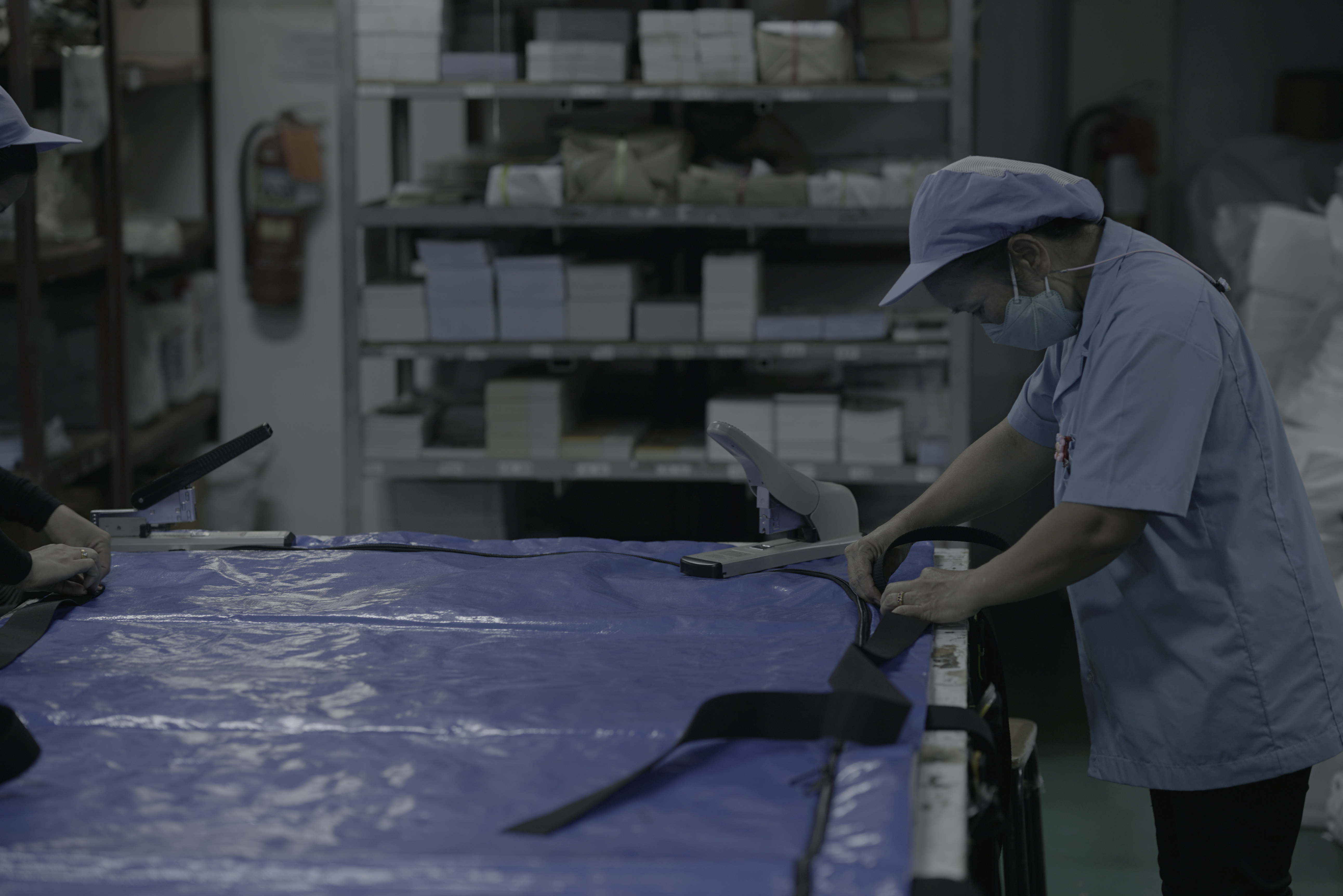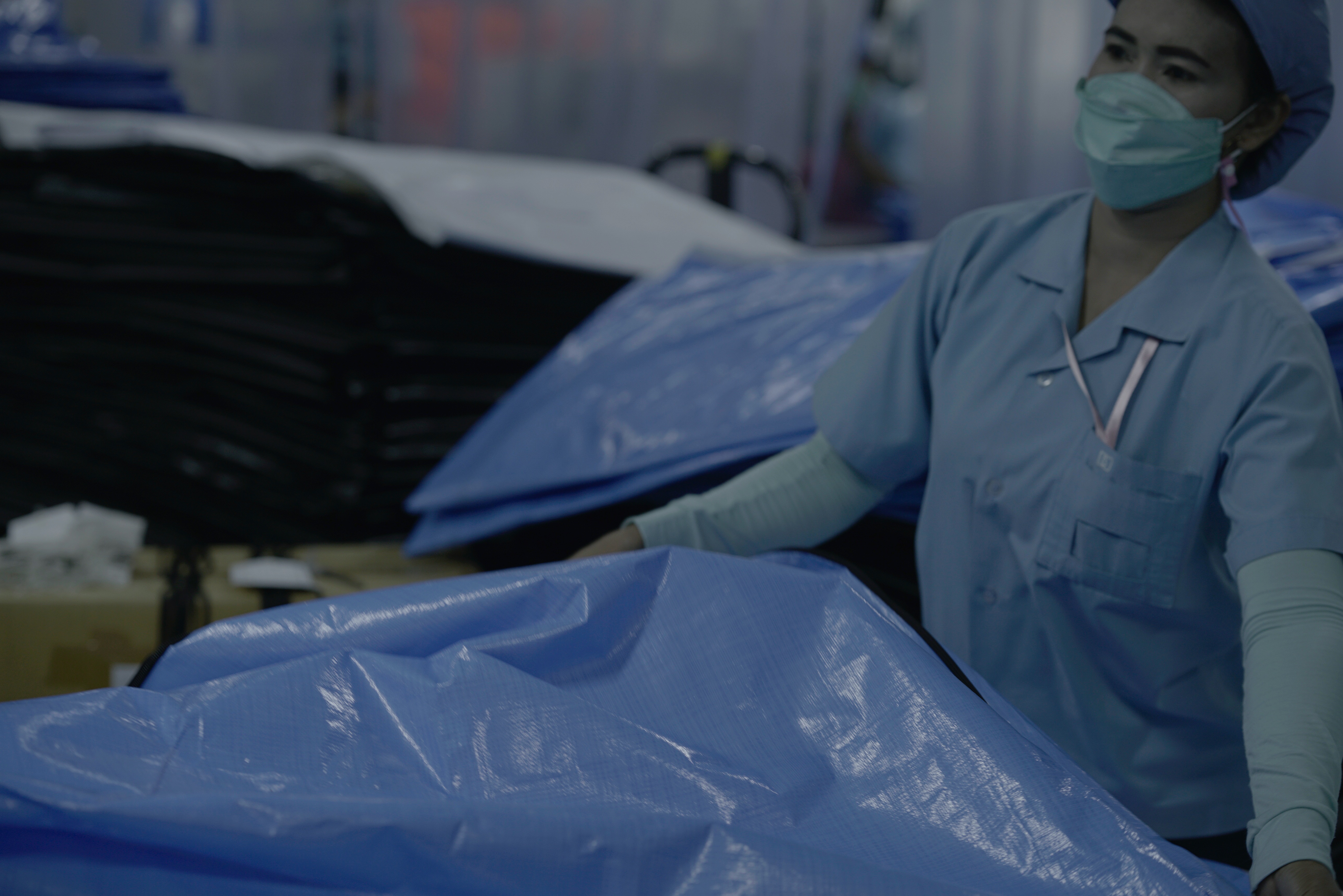The Thai Factory Making Body Bags for American COVID Victims
March 2, 2021Arawan Saythawin tries not to think too much about how the products she makes are connected to the grief, loss and last moments of the pandemic’s many victims. But there are moments when she can’t help it.
“Sometimes when I turn on the TV and I see a body bag being used on the news, I wonder, was that mine? Did I make that?” she said in an interview.
Arawan works at Winbest Industrial, a midsize factory in Chachaengsao, Thailand, located about an hour southeast of Bangkok. The province is known for its glittering Buddhist temples. But the town is also an industrial juggernaut that exports a range of goods from electronics to metal works and medical supplies.
At Winbest, the demand for body bags is the highest it’s been since the 2004 Indian Ocean tsunami, an event that took the lives of 200,000 people.
“Sometimes when I turn on the TV and I see a body bag being used on the news, I wonder, was that mine? Did I make that?”
A large portion of the 300 or more bags made every day at Winbest are destined for the United States, where over 500,000 people have already died from the virus, and where body bags are in high demand even as the rollout of vaccines has slowed the number of cases and deaths.
“We realize that our jobs are more important and there’s more responsibility now,” Arawan said from the factory floor, as sewing machines and other mechanical contraptions roared in the background of the vast space illuminated by fluorescent lighting. “We understand why the orders have been increased and we feel added pressure to meet our goals and our projected numbers.”

Winbest also produces beauty products, medical equipment and cleaning room supplies. But body bags are now the main event
In the 26 years she has worked at Winbest, Arawan says demand for the bags has never been this high. She takes pride in her work, explaining that the PVC and high-density polyethylene bags are designed to help stop the spread of the disease.
Her own country has been relatively unscarred by the coronavirus, with under 100 deaths despite Thailand being the first to report a case outside of China nearly a year ago on Jan. 13, 2020. Arawan doesn’t feel worried about contracting the virus herself because she doesn’t go home to a family. At the factory, she just tries to keep her mind occupied with the work, which has led to more hours, overtime and higher monthly wages.
Workers at the factory earn roughly $350 a month. But with overtime, they can easily make up to $400 or more. They generally start their days at 8 a.m. and work until 5 p.m., but Winbest added a night shift to meet the influx of orders. The company is currently in talks with other distributors in Europe as well. They’ve doubled the number of employees in the body bag production department to handle the rising demand.
“In a way, the pandemic is actually a good thing for us [at Winbest], because now we’re producing more and making more money,” Arawan said, minutes before resuming sewing and adding curved zippers to the bags. “So it’s a good thing in that sense.”
It’s a Rewarding Job for Many
As it has become clear that factories can be hotbeds for the disease, other workers at Winbest are more cautious.
To the side of the same large room, another woman, Saipin Phintasorn, 33, was busy folding a large plastic sheet before transferring the material over to sewing teams. Towards the end of the room, about ten other women were busy stitching together materials.
“My family is also trying to deal with the change the pandemic has brought us,” Saipin said. “We’re trying to be more careful with what we touch, where we go. I’m worried if I get [COVID-19] how my children are going to live at home without me.”
Thailand was highly effective at curbing the spread of the virus early on. The country implemented strict restrictions starting in February last year. The swift action and widespread mask usage helped keep cases low. Today, the Southeast Asian country has seen 26,000 cases and 83 deaths. But the nation is currently experiencing a second wave, with dozens of confirmed cases everyday.

The pandemic has taken an economic toll as well, with the vital tourism sector drying up and the service industry in disarray. In 2020, the World Bank projected the economy to contract by 5 percent. Others predicted a contraction of 8.5 percent.
Many Thais like Saipin are cautiously optimistic about a new vaccine campaign, yet they’re still concerned over the possibility of another outbreak.
Saipin has a six-year-old daughter and a three-year-old son. Her husband works as a mechanic nearby. She moved to Chachaengsao to be with him.
She said people are often surprised when they hear about her work. There’s almost a taboo surrounding the fact that their product ends up being used for the dead. But as a Buddhist, Saipin believes the job is virtuous.
“I also feel that doing this kind of work makes merit for me,” Saipin said. “It’s a rewarding job in some ways because we know that we are helping people.”
To meet the larger orders for body bags has proved challenging. Outside of China, Winbest is the only company producing bags at scale in the region, according to manager Yiyu Lin, whose grandfather started the firm.
“At first…I didn’t think much about the body bags, I just thought about it as a product,” Yiyu said. “I also tell my employees , ‘don’t be afraid, it’s just a bag, don’t think too much. It’s just a product.’ But when COVID happened, suddenly we got all of these orders, so we have to push ourselves to make as much as we can to help people,” he said.
Yiyu added that he feels a greater sense of responsibility in light of the pandemic, a feeling he said the entire company shares. The need is greater than he could have imagined. Although the company started preparing for a spike in deaths back in March 2020, Yiyu didn’t anticipate the pandemic to kill more than 2.5 million people.
“I didn’t think this many people would die. I thought it was just like the flu at first,” he said.
For Arawan, the bags are a reminder that she lives in an increasingly connected world with shared problems and goals. The bags are a symbol of the global reach of the virus.
“I’m proud that I make these for people overseas,” she said.
